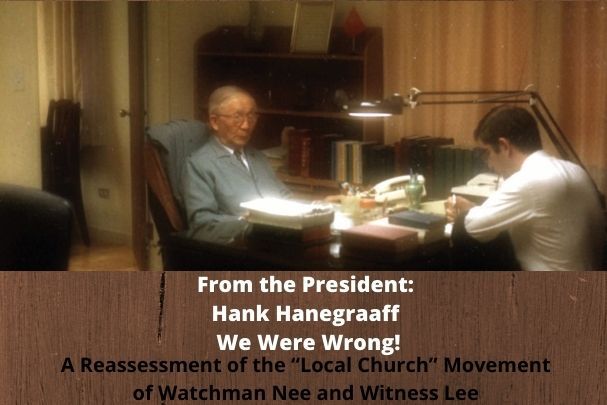This article first appeared in the Christian Research Journal, volume 32, number 06 (2009). For further information or to subscribe to the Christian Research Journal please click here.
The JOURNAL you hold in your hand features the culmination of a six·year research project respecting a movement originally founded by a Chinese Christian named Watchman Nee. While Nee died for his Messiah in a Communist prison camp, his ministry did not die with him. Under the leadership of protege Witness Lee, Nee’s ministry and message spread from China throughout the Pacific Rim nations ranging from Singapore to Taiwan and eventually to the West. In 1962 Lee moved to Southern California and established the local churches and their publishing arm Living Stream Ministry.1
As President of the Christian Research Institute (CRI), I inherited a wealth of information on cults, the occult, and aberrant Christian theologies. My assumption was that as an organization committed to first-rate primary research the information in our files was substantially correct. Over the past twenty plus years this assumption has been validated time and time again. But not always. In the mid ’70s the Christian Research Institute in collaboration with researchers Bob and Gretchen Passantino initiated an evaluation of the local churches that would become a fountainhead of misinformation.
This reality began to surface in 2003 when I asked Gretchen Passantino and Elliot Miller, editor-in-chief of the CHRISTIAN RESEARCH JOURNAL, to join me for a meeting with representatives of Living Stream Ministry. During the meeting I heard stirring affirmations of the very doctrines the local churches allegedly denied. One by one, and in their own words, representatives of the local churches testified to their belief in one God, revealed in three persons who are eternally distinct; to the reality that human beings can never ontologically attain Godhood; and to the fact that they were “only the church” as opposed to being “the only church.”
As a result, I initiated a research project culminating in The expanded cover story of this Special Edition of the CHRISTIAN RESEARCH JOURNAL Primary research was conducted not only in the U.S. but in such faraway places as China, Taiwan, South Korea, and England. It involved careful evaluation of literally hundreds of books, papers, church documents, and audio and video recordings. Even court documents.2 The result of our primary research is encapsulated in the following three word;: “We were wrong!”
Gretchen Passantino uttered the words, ” I was wrong,” to a believer in Shanghai who had been in prison from the time his daughter was born to the time she turned seventeen. Elliot Miller said, ” I was wrong,'” to a man in Fuqing who had suffered imprisonment for a total of twenty-four years. Their words were not merely uttered in the moment of emotion. No! They were uttered after years of painstaking primary research.
While we have significant doctrinal differences with the local churches on nonessentials such as aspects of eschatology (my book, The Apocalypse Code, testifies to that reality), when it comes to essential Christian doctrine-the very doctrines for which the martyrs spilled their blood-we stand shoulder-to-shoulder.
The Christian Research Institute is no stranger to controversy. Y2K is a classic case in point. The cover story of a 1999 edition of the CHRISTIAN RESEARCH JOURNAL was titled “The Millennium Bug Debugged.” As a result, we were characterized as “blind to truth” or “downright uninformed,'” like an ostrich with our head in the sand. When I suggested on the Bible Answer Mall broadcast that Y2K would not even be a top-ten news Story in the year 2000, I was accused of causing complacency in the body of Christ. One broadcaster went so far as to say that I would have the blood of millions of Christians on my hands because I was causing complacency in the body of Christ. I experienced the wrath of Christian gate-keepers, who were selling freeze-dried food and survival kits, and of people in the pews, who were absolutely certain that their leaders—particularly those politically connected—could not possibly be wrong on such a crucial matter.
Another significant controversy involved Herbert W. Armstrong’s Worldwide Church of God. I still vividly recall the controversy that erupted in the ’90s when I began meeting with church leaders. Yet, in 1994 the CHRISTIAN RESEARCH JOURNAL and the Bible Answer Man broadcast were privileged to be first to announce publicly that the Worldwide Church of God had embarked upon a course virtually uncharted in church history-a course that took them from the kingdom of the cults to the kingdom of Christ. Moreover, I was blessed to be able to write the foreword to a book by Joseph Tkach, President of the Worldwide Church of God, titled Transformed by Truth . Today he is not only my dear friend, but my brother in Christ-one who has made the pilgrimage from cultism to Christ.
In those days our ministry was deeply grateful for the friendship and support extended to “The Church Reborn” by cult expert Dr. Ruth Tucker, Christianity Today’s David Neff, Azusa Pacific University, Fuller Seminary, and Regent College. Together we believed that if God could redirect entire movements by changing the hearts of leaders, there was no telling what He might yet do through our continued faithfulness.
Joseph Tkach, by God’s grace was able to utter the words, “We were wrong.” We now express those same words regarding our stance on Watchman Nee, Witness Lee, and the local churches.
The cost has been significant. Integrity has been questioned, motives challenged, and slander has ensued. As a result, support has been compromised. If I heard it once I heard it a thousand times. How can seventy Christian leaders who signed an open letter (see the cover Story ) calling the local churches to confess their false doctrines and practices be wrong? Surely, the integrity of CRI has been compromised.
In the midst of the turmoil I have reminded staff that ministry is no place for a popularity contest. That it is not about the size of the platform. Or about political correctness. At the end of the day, we do what we do, because Truth matters!
Whatever the cost it pales by comparison to that borne by the persecuted church in China and around the world. That reality was memorialized in a moment forever emblazoned upon my mind. A Chinese woman with brilliant smile had just finished communicating the experience of incarceration due to reading unauthorized material in an unauthorized meeting. Not a hint of self-pity. Only the radiance of a follower of Christ who had experienced the reality of authentic New Testament Christianity. When she finished, she thanked me for standing for truth no matter the cost. Never have I felt more unworthy. Whatever I face pales by comparison to what she and multitudes like her have suffered.
Perhaps no three words are more likely to stick in our throats than the words, ” I was wrong.” Yet for a ministry committed to the maxim, “because Truth matters,” the willingness to utter these words is not an option, it’s an essential.
—Hank Hanegraaff
Notes
1 Because Nee had no intention of starting a new church movement or denomination, and because he considered himself ” just a brother” and nor a pastor or leader, there was no formal transfer of “authority” from Nee to anyone else. Therefore, there have always been some who have denied legitimacy to Lee’s leadership and who have, in fact, disagreed strongly with Lee’s understanding of Nee’s teachings. We have examined these alternative interpretations and developments of Nee’s teachings and do not believe that there is significant difference between Nee and Lee, nor any compelling evidence that Nee and Lee represent different teachings or different expressions of the church.
2 Elliot Miller and Gretchen Passantino, who had participated in the original research in the 1970s, were in a unique position to evaluate deficiencies. Bob Passantino died in November 2003 and was therefore not able to contribute to the recent research. Before his death, however, he agreed with his wife and ministry partner, Gretchen, that a reevaluation was necessary and was likely to determine that the original research was at best incomplete and at worst grossly inaccurate.
3 Joseph Tkach, Transformed by Truth (Sisters, OR: Multnomah Books, 1997),54.









